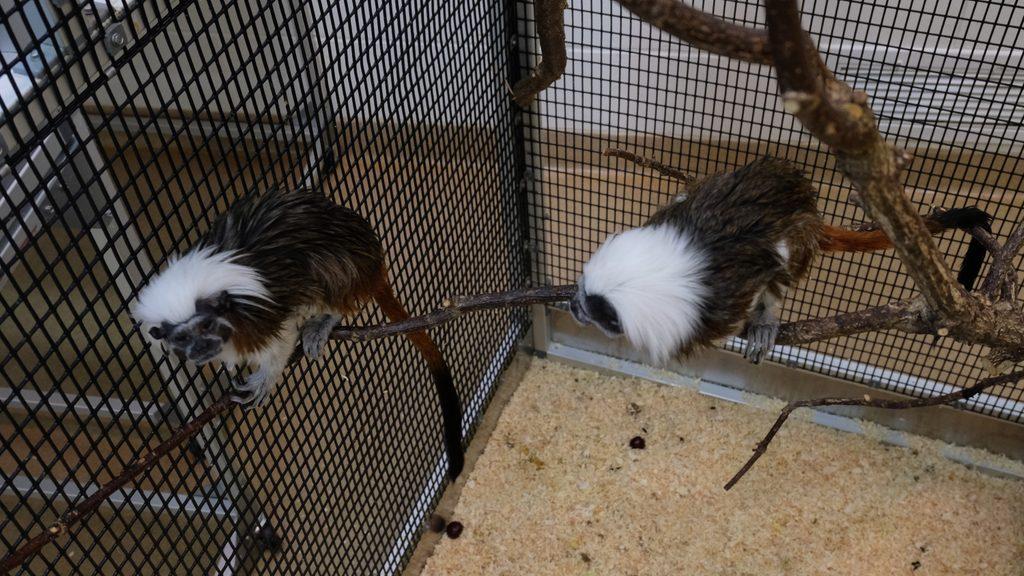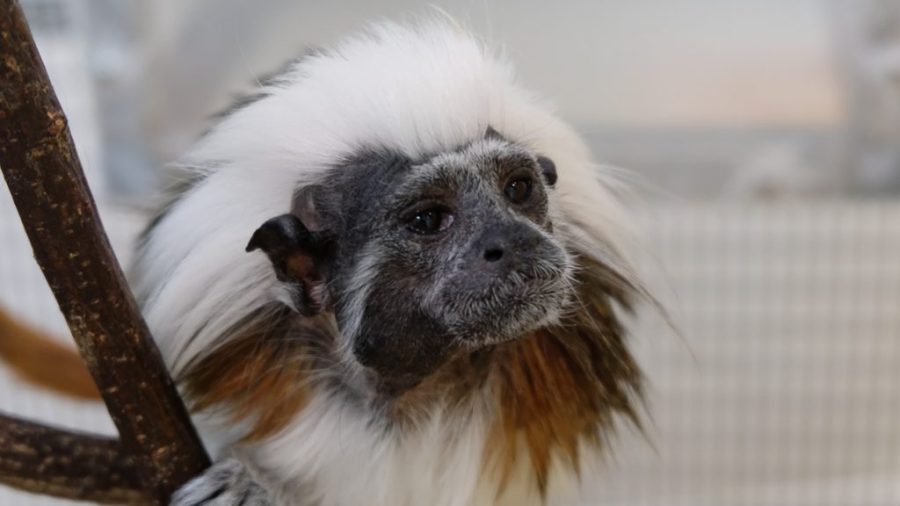For most students, Hulings Hall is the location of the Biology and Psychology departments, but for the eight tamarin monkeys in Professor of Psychology Julie Neiworth’s Primate Cognition Lab, Hulings is home.
Since 1998, Neiworth has worked with 32 tamarins spanning three generations, earning four National Institute of Health (NIH) grants that total $1,101,651. In the lab, Neiworth and student research assistants study the tamarins’ perception, cognition and social behavior. Research has included aging and Alzheimer’s in a primate model; competition, sharing, and cooperation; and comparing children’s thinking and strategies with tamarins, among other topics.
Before coming to Carleton, the cohort of monkeys were studied at University of Wisconsin-Madison, where mating, family dynamics and hormone assays were of interest. They have never been in any medical or invasive research and Neiworth reported that her researchers see “very normal social and play behaviors that indicate they are happy.”
Neiworth explained that they never display the pacing or isolation seen in zoo settings and that they live in social groups with lots of toys and hammocks for playing and resting. The tamarins at the Primate Cognition Lab live longer than wild tamarins as a result of NIH guidelines for animal species, the OLAW federal branch guidelines and USDA for healthy living guidelines for primates.
“They are all my favorite,” said Neiworth of her monkeys. “They all have personalities—they are bossy, or silly, or curious, or sometimes easily nervous. Just like people. We learn what they like and how to work with them to make them at ease and interested in the cognitive tasks. They work on iPads with us. It’s lots of fun.”
“They care a lot more about what humans have on their feet as a means of identification. We all have shoes that we wear specifically around the monkeys so that they recognize us. If you wear something different they will spend a lot of time looking at your feet,” said Chris Leppink-Shands ’19, an Educational Associate at the lab.

Elena Morales-Grahl ’23 started working at the lab this year after taking Neiworth’s Learning and Memory class, where she had the opportunity to work with pigeons.
“It’s very cool to see the monkeys open up to you and show you their personalities,” said Morales-Grahl. “I cannot choose a favorite monkey, but I will say I have a soft spot for Encore and Yogi. Yogi is super curious and loves playing with the key that one puts on the cage when entering it.
“Yogi used to mischievously grab the key when I was delivering his food, so I learned to position it in a way that he could play with it but not take it,” continued Morales-Grahl. “He has now been given his own key to play with, so he no longer has a need to take the door key.”
Three times a day, the researchers feed the monkeys “with lots of fresh fruit and veggies, canned monkey chow, yogurt and applesauce and snacks like peanuts, diced boiled eggs, granola, and tuna,” explained Neiworth. During some studies, they get “sweet cereal treats,” their favorite being Frosted Cheerios and Froot Loops. Neiworth performs daily health checks, in which the monkeys are given a yogurt pretzel.
“The monkeys were named when they arrived, except for a few who were born here. Their names are part of family history, so there is a musical family and we have Encore and Forte here. By keeping their names and noting their families, we know their genetic background,” Neiworth said.
“We named Oriole, also here at present, who was born at Carleton because her dad was from the bird family (Vulture) and her mom was one of the original monkeys brought here in 1998 and was named Olympia,” Neiworth continued. “So we picked a bird name that started with an O to represent mom and dad.”
Tamarins are an endangered species and Neiworth said that “we are very careful to keep them happy and healthy.”
“I strongly encourage people to take the time to learn about and understand the consequences and impacts human behavior, primarily deforestation, has on different species and their habitats. These primates for example are typically found in Colombia but in recent years almost 98% of their habitat has been destroyed. I’d encourage people to check out organizations such as Proyecto Titi if they want to learn more about ways they can help and make a difference!” said Leppink-Shands.

Photo provided by the Primate Cognition Lab.










